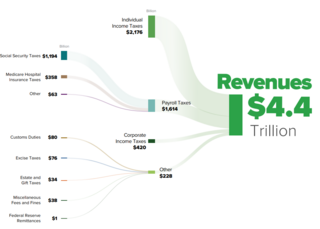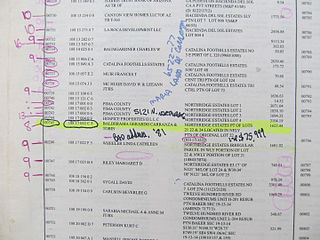
The United States has separate federal, state, and local governments with taxes imposed at each of these levels. Taxes are levied on income, payroll, property, sales, capital gains, dividends, imports, estates and gifts, as well as various fees. In 2020, taxes collected by federal, state, and local governments amounted to 25.5% of GDP, below the OECD average of 33.5% of GDP.
Wexis is a humorous portmanteau used to refer to the alleged duopoly of publishing conglomerates that dominate the U.S. legal information services industry – namely, West Publishing and LexisNexis.

A tax lien is a lien which is imposed upon a property by law in order to secure the payment of taxes. A tax lien may be imposed for the purpose of collecting delinquent taxes which are owed on real property or personal property, or it may be imposed as a result of a failure to pay income taxes or it may be imposed as a result of a failure to pay other taxes.
Garnishment is a legal process for collecting a monetary judgment on behalf of a plaintiff from a defendant. Garnishment allows the plaintiff to take the money or property of the debtor from the person or institution that holds that property. A similar legal mechanism called execution allows the seizure of money or property held directly by the debtor.
Wolters Kluwer N.V. is a Dutch information services company. The company serves legal, business, tax, accounting, finance, audit, risk, compliance, and healthcare markets.

Irwin Allen Schiff was an American libertarian and tax resistance advocate known for writing and promoting literature in which he argued that the way in which the income tax in the United States is enforced upon individuals as a tax on one's time or wages, is illegal and unconstitutional. Judges in several civil and criminal cases ruled in favor of the federal government and against Schiff. As a result of these judicial rulings Schiff was in a hospital prison serving a sentence of 162 months at the time of his death.
Tax protesters in the United States have advanced a number of arguments asserting that the assessment and collection of the federal income tax violates statutes enacted by the United States Congress and signed into law by the President. Such arguments generally claim that certain statutes fail to create a duty to pay taxes, that such statutes do not impose the income tax on wages or other types of income claimed by the tax protesters, or that provisions within a given statute exempt the tax protesters from a duty to pay.

CT, or the Corporation Trust Company, is a wholly owned subsidiary of Wolters Kluwer, a multi-national information services company based in the Netherlands with operations in more than 35 countries. It provides software and services that legal professionals use.
We the People Foundation for Constitutional Education, Inc. also known as We the People Foundation is a non-profit education and research organization in Queensbury, New York with the declared mission "to protect and defend individual Rights as guaranteed by the Constitutions of the United States." It was founded by Robert L. Schulz. At the U.S. Department of Justice, he is known as a "high-profile tax protester". The Southern Poverty Law Center asserts that Schulz is the head of the leading organization in the tax protester movement. The organization formally served a petition for redress of grievances regarding income tax upon the United States government in November 2002. In July 2004, it filed a lawsuit in an unsuccessful attempt to force the government to address the petition. The organization has also served petitions relating to other issues since then.
A tax levy under United States federal law is an administrative action by the Internal Revenue Service (IRS) under statutory authority, generally without going to court, to seize property to satisfy a tax liability. The levy "includes the power of distraint and seizure by any means". The general rule is that no court permission is required for the IRS to execute a tax levy.
Wolters Kluwer Canada is one of the four operating units of Wolters Kluwer Tax & Accounting. Wolters Kluwer Canada is a provider in the area of tax, accounting, law, human resources and financial planning.
Tax protester Sixteenth Amendment arguments are assertions that the imposition of the U.S. federal income tax is illegal because the Sixteenth Amendment to the United States Constitution, which reads "The Congress shall have power to lay and collect taxes on incomes, from whatever source derived, without apportionment among the several States, and without regard to any census or enumeration", was never properly ratified, or that the amendment provides no power to tax income. Proper ratification of the Sixteenth Amendment is disputed by tax protesters who argue that the quoted text of the Amendment differed from the text proposed by Congress, or that Ohio was not a State during ratification, despite its admission to the Union on March 1, 1803, more than a century prior. Sixteenth Amendment ratification arguments have been rejected in every court case where they have been raised and have been identified as legally frivolous.
Tax protesters in the United States advance a number of constitutional arguments asserting that the imposition, assessment and collection of the federal income tax violates the United States Constitution. These kinds of arguments, though related to, are distinguished from statutory and administrative arguments, which presuppose the constitutionality of the income tax, as well as from general conspiracy arguments, which are based upon the proposition that the three branches of the federal government are involved together in a deliberate, on-going campaign of deception for the purpose of defrauding individuals or entities of their wealth or profits. Although constitutional challenges to U.S. tax laws are frequently directed towards the validity and effect of the Sixteenth Amendment, assertions that the income tax violates various other provisions of the Constitution have been made as well.
A tax protester is someone who refuses to pay a tax claiming that the tax laws are unconstitutional or otherwise invalid. Tax protesters are different from tax resisters, who refuse to pay taxes as a protest against a government or its policies, or a moral opposition to taxation in general, not out of a belief that the tax law itself is invalid. The United States has a large and organized culture of people who espouse such theories. Tax protesters also exist in other countries.
Tax protester arguments are arguments made by people, primarily in the United States, who contend that tax laws are unconstitutional or otherwise invalid.
Tax protesters in the United States advance a number of administrative arguments asserting that the assessment and collection of the federal income tax violates regulations enacted by responsible agencies –primarily the Internal Revenue Service (IRS)– tasked with carrying out the statutes enacted by the United States Congress and signed into law by the President. Such arguments generally include claims that the administrative agency fails to create a duty to pay taxes, or that its operation conflicts with some other law, or that the agency is not authorized by statute to assess or collect income taxes, to seize assets to satisfy tax claims, or to penalize persons who fail to file a return or pay the tax.
CompleteTax was an online tax preparation software developed by CCH, owned by Wolters Kluwer, for individuals to use to prepare and file their federal and state income tax returns in the United States.
The Internal Revenue Manual (IRM) is an official compendium of internal guidelines for personnel of the United States Internal Revenue Service (IRS).



